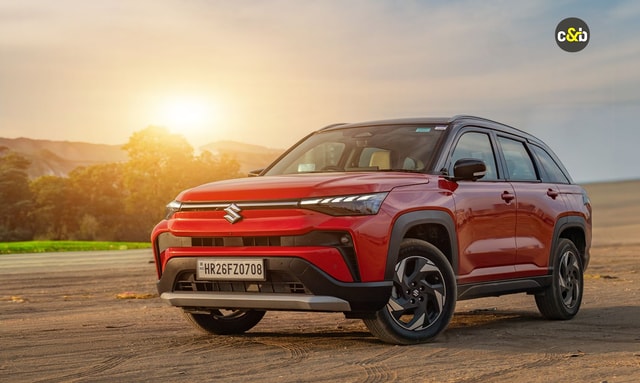All About Driving Electric Cars In The Rains

Electric cars have suddenly become more visible on Indian roads and that is a brilliant change in the direction of saving the environment. Moreover, EV infrastructure has also developed quite a bit in the country. Owing to this, a lot of people are considering buying electric vehicles. However, there still is a lot of skepticism around EVs and the biggest concern people have is whether it is safe to drive and charge an EV while it's pouring outside. And why not, in a country like India where certain states and cities see heavy rainfalls for almost six months in a year, the concern is more real than not. So let's answer some commonly asked questions with respect to rains and EVs.

Is it okay to charge your EV in the rains?
We all know that water conducts electricity. So it's a valid concern that you might be electrocuted. However, fortunately, electric car chargers are weatherproof and are specifically designed to protect both the car and its passengers from electrical shock. Electric vehicle chargers are also rigorously tested and have to meet certain standard safety norms. Furthermore, waterproofing electrical connectors, as well as any other electric equipment, is mandatory. So, the short answer is yes, you can charge your EV in the rains without getting electrocuted.

What happens if lightning strikes on your EV?
Most people are concerned about what would happen if lightning strikes on their EV. To be honest, you probably might be safer in a car if lightning were to actually strike the vehicle. The rationale behind this is that when a bolt of lightning hits a car, it hits the exterior which is a metallic surface. Now, because of the electromagnetic effects on the skin of the vehicle, the current would actually pass down safely into the ground. This is known as the Farraday Effect. An NHTSA report also compared exactly the same kind of situation with an ICE and electric car and it reported that electric vehicles are by no means at a higher propensity to their ICE siblings. In fact, they are comparatively lesser prone to any damages in case lightning strikes.
Will your EV get damaged in a waterlogged area?
Modern-day electric vehicle batteries have an IP67 rating. This is quite adequate as anything past IP67 is used generally for specialized equipment such as submarines, etc. An IP67 rating allows you to submerge the vehicle in water up to a meter in height for up to 30 mins without any leakage. Thus, in a situation where the car needs to encounter waterlogging or a flood-like situation which is usually about 300mm wading depth one does not have to worry about damage to the terminals, connectors and high voltage architecture of the vehicle. Additionally, driving an electric car into a pool of water doesn't cause any malfunction, and doesn't conduct electricity into the water around the vehicle. All systems, inside the battery pack, have multiple layers of protective cutoffs which activate at the first sign of water ingress. The main battery pack also has the ability to isolate itself electrically from the rest of the car.

So, it's extremely clear that driving an EV in the rains is not a matter of concern as it's absolutely waterproof and safe. Let us know in the comments below if you have any more questions and we will try and answer that for you soon. Also, go ahead and get that EV without second guessing.
Latest News
 car&bike Team | Feb 25, 2026Jio-bp Demonstrates Petrol With ACTIVE TechnologyUnveiled at India Energy Week 2026, the formulation helps keep engines cleaner, improve efficiency, and deliver enhanced performance, without additional cost to customers.2 mins read
car&bike Team | Feb 25, 2026Jio-bp Demonstrates Petrol With ACTIVE TechnologyUnveiled at India Energy Week 2026, the formulation helps keep engines cleaner, improve efficiency, and deliver enhanced performance, without additional cost to customers.2 mins read car&bike Team | Feb 25, 2026Tata Passenger Electric Mobility, Shell Launch 21 EV Charging Stations Across IndiaThe newly launched charging stations are spread across Bengaluru, Chennai, Mysuru, Pune, and Vadodara.1 min read
car&bike Team | Feb 25, 2026Tata Passenger Electric Mobility, Shell Launch 21 EV Charging Stations Across IndiaThe newly launched charging stations are spread across Bengaluru, Chennai, Mysuru, Pune, and Vadodara.1 min read car&bike Team | Feb 25, 2026Over 1 Lakh Motorists to Get Toll Refund After Major Mumbai-Pune Expressway DisruptionMSRDC will refund Rs 5.16 crore in tolls to motorists affected by the Expressway Tanker Incident, which occurred earlier this month.1 min read
car&bike Team | Feb 25, 2026Over 1 Lakh Motorists to Get Toll Refund After Major Mumbai-Pune Expressway DisruptionMSRDC will refund Rs 5.16 crore in tolls to motorists affected by the Expressway Tanker Incident, which occurred earlier this month.1 min read car&bike Team | Feb 24, 20262026 KTM 250 Duke, 200 Duke Updated With New Colour OptionsThe 250 Duke gets two new colour options while the 200 Duke gets one.2 mins read
car&bike Team | Feb 24, 20262026 KTM 250 Duke, 200 Duke Updated With New Colour OptionsThe 250 Duke gets two new colour options while the 200 Duke gets one.2 mins read car&bike Team | Feb 24, 2026Mercedes-Benz CLA Electric Debuts In India: Bookings Open March 10This is the first time the CLA nameplate will be offered in an electric derivative with the EV claimed to offer 792km WLTP range.3 mins read
car&bike Team | Feb 24, 2026Mercedes-Benz CLA Electric Debuts In India: Bookings Open March 10This is the first time the CLA nameplate will be offered in an electric derivative with the EV claimed to offer 792km WLTP range.3 mins read car&bike Team | Feb 24, 2026Jeep Wrangler Willys 41 Special Edition Reintroduced: Priced At Rs 70.31 LakhThe Wrangler in this edition wears a military green paint scheme and is limited to just 41 units across India.1 min read
car&bike Team | Feb 24, 2026Jeep Wrangler Willys 41 Special Edition Reintroduced: Priced At Rs 70.31 LakhThe Wrangler in this edition wears a military green paint scheme and is limited to just 41 units across India.1 min read
 Preetam Bora | Feb 24, 2026Hero Destini 110 Review: Simplicity, RefinedThe Hero Destini 110 is a no-nonsense commuter that is simple, comfortable and above all, fuel efficient. In 2026, when buyers are spoilt for choice, is it good enough to consider?1 min read
Preetam Bora | Feb 24, 2026Hero Destini 110 Review: Simplicity, RefinedThe Hero Destini 110 is a no-nonsense commuter that is simple, comfortable and above all, fuel efficient. In 2026, when buyers are spoilt for choice, is it good enough to consider?1 min read Preetam Bora | Feb 23, 2026TVS Apache RTX Road Test Review: Redefining the Entry-Level ADVAfter spending some time with the TVS Apache RTX in traffic, the daily commute, as well as on open highways, one thing becomes clear: the RTX is trying to redefine the entry-level ADV segment. But is it without fault?1 min read
Preetam Bora | Feb 23, 2026TVS Apache RTX Road Test Review: Redefining the Entry-Level ADVAfter spending some time with the TVS Apache RTX in traffic, the daily commute, as well as on open highways, one thing becomes clear: the RTX is trying to redefine the entry-level ADV segment. But is it without fault?1 min read Girish Karkera | Feb 20, 2026Road Test: 2025 VinFast VF7 AWD Sky InfinityFlagship all-electric SUV from the Vietnamese car maker gets most of the basics right.1 min read
Girish Karkera | Feb 20, 2026Road Test: 2025 VinFast VF7 AWD Sky InfinityFlagship all-electric SUV from the Vietnamese car maker gets most of the basics right.1 min read Jaiveer Mehra | Feb 18, 2026New BMW X3 30 Vs Mercedes-Benz GLC 300: Midsize Luxury SUV FaceoffWith the new X3 30, BMW has a direct competitor to the petrol GLC 300, but which is the luxury SUV for you?1 min read
Jaiveer Mehra | Feb 18, 2026New BMW X3 30 Vs Mercedes-Benz GLC 300: Midsize Luxury SUV FaceoffWith the new X3 30, BMW has a direct competitor to the petrol GLC 300, but which is the luxury SUV for you?1 min read Jafar Rizvi | Feb 15, 2026Maruti Suzuki Victoris: Long-Term Review - Report 1The Victoris is Maruti’s latest offering for the Indian market, and after spending some time with it, here are a few early impressions.1 min read
Jafar Rizvi | Feb 15, 2026Maruti Suzuki Victoris: Long-Term Review - Report 1The Victoris is Maruti’s latest offering for the Indian market, and after spending some time with it, here are a few early impressions.1 min read
























































































































